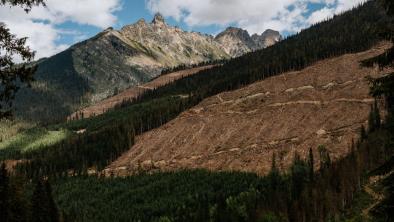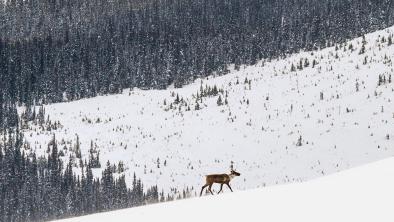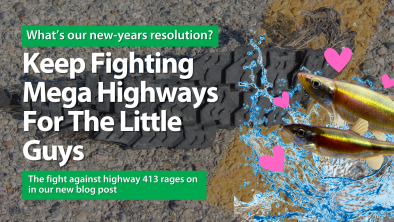Wild salmon: Culture of the salmon crash
Wednesday, March 24, 2010
Lillooet News

The Salmon Talks brought people out on Saturday night. Poets, dancers, singers, speakers and a puppeteer launched the culture of the salmon crash at the Lillooet Friendship Centre. With a salmon, chili and beef dinner served up by the Unity Riders, fundraising for their upcoming journey, people listened and talked about the state of the salmon.
Over 100 people attended the packed Wild Salmon Cafe. Much of the food was provided by donors. Buy-Low Foods contributed produce while community members supplied fish, rice, and baked goods.
“We are the salmon,” said poet and master of ceremonies Jonathan (Swamp) Kerslake. “The salmon are lost, where are they? Are they lost? I don’t think it’s them. I think it’s you,” spoke Christine Jack. “Síma wi Ts’áoqwaoz!” chorused the St’át’imc Sisters. Ancient Echoes performed a dance, Kerry Coast spoke, and great local musicians the Anarchist Lovebirds, Chief Mike Leach, and The Harshmallows played to about a hundred people. The messages hearkened back to the key theme, what does it take to restore balance to the river?
Last year was the dominant year of the four year cycle for Fraser system sockeye. Historically, that year brought a hundred million salmon upriver. In 2009, less than one million sockeye returned to Fraser spawning grounds. We are at one per cent of what used to be the B.C. Pacific sockeye numbers.
There are as many causes of the decline as there are runs in the river, which is thousands. For starters, salmon stocks never recovered from the initial blow – the Hells Gate slides of summers in 1914 and 1915, when the PGE was blasting railway tracks through the canyon. For decades the commercial fishery on the coast was taking up to 90 per cent of the runs. Today we are faced with unstoppable developments, which many scientists have earmarked as the key area for curtailment. We have decisions about Enbridge pipeline (through the Fraser headwaters), Fish Lake mine (tailings leaching into the Chicotin River, and then the Fraser), garbage dumps, and condos on the rivers.
And there is the question of “international cooperation.” 90 per cent of the open-net-cage fish farms on the coast, the ones responsible for what now appears to be major impacts to wild salmon and coastal ecosystems generally, are owned by Norwegian companies. 80% of their product is shipped directly to the United States.
On March 20, at the first ever Wild Salmon Café, it was announced that one of the first campaigns is to make Lillooet the first farmed-salmon-free-zone. People were urged to join the lobby for the closure of three key farms by mid May. The Salmon Talks draws on community members of bands, the District of Lillooet, and the regional district – as well as watershed-wide affiliates, to make some strategies. No one living on the mid-Fraser can deny that salmon is common ground.
Salmon Talks meets monthly at the Lillooet Tribal Council. This Thursday, March 25, is the next meeting, at 6:30 p.m. Bring yourself, bring a friend and enjoy some coffee, education, and action plans. We have got to get together on this.
Over 100 people attended the packed Wild Salmon Cafe. Much of the food was provided by donors. Buy-Low Foods contributed produce while community members supplied fish, rice, and baked goods.
“We are the salmon,” said poet and master of ceremonies Jonathan (Swamp) Kerslake. “The salmon are lost, where are they? Are they lost? I don’t think it’s them. I think it’s you,” spoke Christine Jack. “Síma wi Ts’áoqwaoz!” chorused the St’át’imc Sisters. Ancient Echoes performed a dance, Kerry Coast spoke, and great local musicians the Anarchist Lovebirds, Chief Mike Leach, and The Harshmallows played to about a hundred people. The messages hearkened back to the key theme, what does it take to restore balance to the river?
Last year was the dominant year of the four year cycle for Fraser system sockeye. Historically, that year brought a hundred million salmon upriver. In 2009, less than one million sockeye returned to Fraser spawning grounds. We are at one per cent of what used to be the B.C. Pacific sockeye numbers.
There are as many causes of the decline as there are runs in the river, which is thousands. For starters, salmon stocks never recovered from the initial blow – the Hells Gate slides of summers in 1914 and 1915, when the PGE was blasting railway tracks through the canyon. For decades the commercial fishery on the coast was taking up to 90 per cent of the runs. Today we are faced with unstoppable developments, which many scientists have earmarked as the key area for curtailment. We have decisions about Enbridge pipeline (through the Fraser headwaters), Fish Lake mine (tailings leaching into the Chicotin River, and then the Fraser), garbage dumps, and condos on the rivers.
And there is the question of “international cooperation.” 90 per cent of the open-net-cage fish farms on the coast, the ones responsible for what now appears to be major impacts to wild salmon and coastal ecosystems generally, are owned by Norwegian companies. 80% of their product is shipped directly to the United States.
On March 20, at the first ever Wild Salmon Café, it was announced that one of the first campaigns is to make Lillooet the first farmed-salmon-free-zone. People were urged to join the lobby for the closure of three key farms by mid May. The Salmon Talks draws on community members of bands, the District of Lillooet, and the regional district – as well as watershed-wide affiliates, to make some strategies. No one living on the mid-Fraser can deny that salmon is common ground.
Salmon Talks meets monthly at the Lillooet Tribal Council. This Thursday, March 25, is the next meeting, at 6:30 p.m. Bring yourself, bring a friend and enjoy some coffee, education, and action plans. We have got to get together on this.


